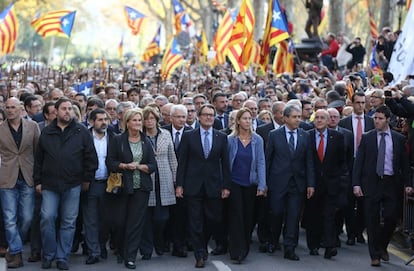Catalan leader to testify in court over last year’s informal self-rule vote
Thousands of supporters show up at the door of Catalonia regional High Court

Catalan premier Artur Mas arrived in court on Thursday morning to testify in connection with the informal referendum on independence held on November 9, 2014.
Mas has been charged with serious disobedience and other crimes for ignoring a court injunction against the unofficial vote, which the central government in Madrid considered illegal.
Mas has been charged with serious disobedience and other crimes for ignoring a court injunction against the unofficial vote
But he was not alone when he walked into the Catalonia regional High Court (TSJC). Pro-independence associations had called a protest outside the courthouse and 400 mayors as well as members of the regional executive were expected to show up to condemn what they see as unfair judicial targeting of the Catalan leader for political reasons.
Shortly before 10 in the morning, there were already more than 2,000 people outside the TSJC waiting for Mas, who stopped to greet some of them before walking in.
Earlier this week, two of Mas’s aides, who also face charges in the case, gave court depositions and received public support from a group of protesters stationed outside the building. This, and a large march held on Tuesday in Barcelona, led the TSJC to issue an unusual statement denouncing “a direct, unmitigated attack” against the independence of the judiciary.
While non-binding and criticized for lack of objectiveness, last year’s ballot yielded a majority support for independence, fueling separatists’ efforts to press ahead with their breakaway plans.
Last month, secessionists grouped together into the Junts pel Sí coalition won the Catalan legislative elections, but Mas is finding it difficult to secure enough internal support to ensure a new term in office.
Now, he hopes that popular support for him over the disobedience charges will pressure his coalition partners into voting for his investiture. The fringe party CUP, which champions feminism and anti-capitalism, holds the key to power in the region but said during the campaign that it would never support Mas’ re-election.
So far, the court case against him does not seem to be moving CUP to reconsider its view that Mas, of the long-ruling Convergence party, represents an era of budget cuts and corruption in the region.
“The court testimony over November 9 is not making us steer away from our positions,” said the party’s number two official, Anna Gabriel, on Wednesday.
English version by Susana Urra.
Tu suscripción se está usando en otro dispositivo
¿Quieres añadir otro usuario a tu suscripción?
Si continúas leyendo en este dispositivo, no se podrá leer en el otro.
FlechaTu suscripción se está usando en otro dispositivo y solo puedes acceder a EL PAÍS desde un dispositivo a la vez.
Si quieres compartir tu cuenta, cambia tu suscripción a la modalidad Premium, así podrás añadir otro usuario. Cada uno accederá con su propia cuenta de email, lo que os permitirá personalizar vuestra experiencia en EL PAÍS.
En el caso de no saber quién está usando tu cuenta, te recomendamos cambiar tu contraseña aquí.
Si decides continuar compartiendo tu cuenta, este mensaje se mostrará en tu dispositivo y en el de la otra persona que está usando tu cuenta de forma indefinida, afectando a tu experiencia de lectura. Puedes consultar aquí los términos y condiciones de la suscripción digital.








































